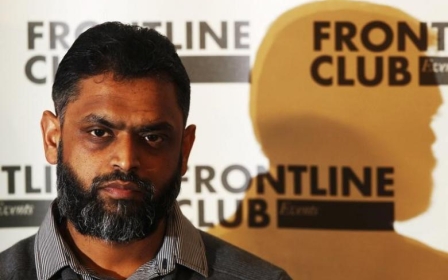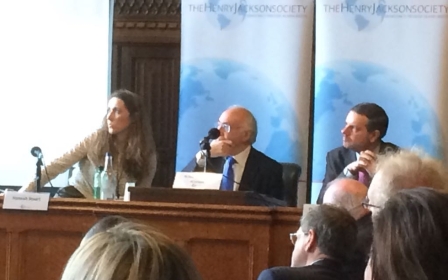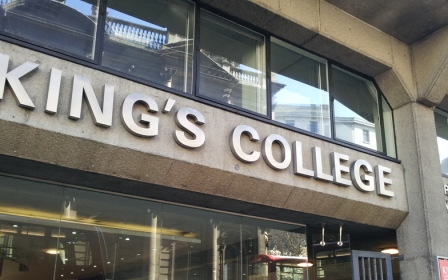The Suicide Squad - or how the Henry Jackson Society fails yet again

Suicide Squad. A movie, born from the comic world, encompassing the DC Comics anti-hero team. A world of villains co-opted for black ops in service of the US government.
It sounded like a good idea at the time. Then everyone watched the film. And it was panned. There were, of course, die-hard fans of the brand who forgave it all, enamoured by characters, actors or a combination of both, regardless of critical merit.
And so too, the Henry Jackson Society (HJS) and the launch of its double-demon titled report: Islamist Terrorism: Analysis of Offences and Attacks in the UK (1998-2015).
This 1,000-page tome reveals the Henry Jackson Society as a pantomime crew characterised by a cohort of politicians, journalists and academics clinging to a neo-conservative agenda like it’s going out of fashion
This 1,000-page tome reveals HJS as a pantomime crew characterised by a cohort of politicians, journalists and academics clinging to a neo-conservative agenda like it’s going out of fashion and heaving its metaphorical boot into all things Muslim. This Tuesday, as on so many days, said same boot stomped Orwell-like upon critical civil society.
There’s no need to belabour the point or further mix metaphors. It would be better to direct everyone’s attention to Hilary Aked’s excellent analysis of HJS and its role in the Islamophobia network and all that entails.
HJS's new report, reduced to the organisation's live tweets, argues that "there is no one typical profile of an offender, there's a wide range of routes into Islamist offences", yet "we need to think about what happens in heavily segregated communities, where authorities might take a hands-off approach", and yet still "there's a role for prisons in prevention" and that "people working in schools can have a role in identifying people at risk".
The age of Prevent
Aside from the fact that there is nowhere in this sceptered isle where the authorities are hands-off, the case it seems to be making is for the age of Prevent. And then some.
Yet the die-hard fans of the HJS motley crew are not the wilfully deluded cinemagoers (I confess to watching way too many bad movies to be judgmental on this). Those that come to heel every time HJS calls are people of privilege and power. In such positions, it is no use for them to claim ignorance.
These days it is not even an excuse to claim laziness - though who will exactly sift through 1,000 pages of what exactly? Why is it then that the lately departed independent reviewer of terrorism legislation, David Andersen, saw fit to write the cover filler?
The assistant commissioner of the Metropolitan Police Service, Mark Rowley, added his own filler, a statement read out by former Tory leader Michael Howard, now Lord Howard. Rowley had been slated to attend but pulled out at the last minute, it is assumed because of the well-deserved backlash from Muslim community figures. The Metropolitan Police and HJS both told MEE that Rowley had been unable to attend because of work commitments.
Anti-terrorism industrial complex
First to the report itself. See the thing about data is, well there can be so very much of it. That’s why when you have something to write about, you choose the data that actually says something and not just, well everything.
There is so much mileage to regurgitating the idea that Muslims are essentially and existentially a threat to Western civilisation, that anyone without a useful thing to say can plug into it
Many eons ago, when Superman wasn’t dead, I attended a meeting where an "author" of a similar report from a US military-minded think tank presented her findings to a group of bemused academics from the UK. Her and her organisation’s thesis was that Muslims could be easily radicalised at the following places: home, school, the mosque, sports centres and religious schools. Basically, everywhere a Muslim might be. Which amounted to what was rather unpolitely pointed out to her by pretty much everyone else in the room, a pathetic attempt at analysis - better, some argued, to confess to bigotry, it was less embarrassing.
These days, however, making such cases is no longer a cause for universal ridicule, not because the thesis is no longer preposterous (in fact, it has been repeatedly and thoroughly debunked). It is because of the industry and culture that has arisen around anti-terrorism.
There is so much mileage from both financial and pseudo-philosophical points of view to regurgitating the idea that Muslims are essentially and existentially a threat to Western civilisation, that anyone without a useful thing to say can plug into this ready-to-go discourse and make something from it.
Reformed radicals get airtime from ready-to-oblige shock-jocks (and a bit of agenda-changing funding here and there); neo-cons get the chance to push a narrative that justifies any number of draconian, militaristic, authoritarian adventures.
Data analysis? Not always meaningful
Lots of data doesn’t necessarily mean lots of meaning. Take the "significance" as reported in The Sunday Times, by Andrew Gilligan, that one-fifth of all those convicted of terrorism offences come from five wards in Birmingham. Likewise other coverage highlights that 43 percent come from London and that the northwest has a high percentage.
Counter-terrorism enables a myriad of policy options for governments that they would otherwise awkwardly and inconveniently be accountable for
Sounds dramatic, except that by and large this reflects the demographics of where Muslims live in greatest numbers in the UK. In other words, it’s not really saying anything significant in data analysis terms. It is implicitly stigmatising Muslims once more by suggesting that maybe it’s just all Muslims everywhere indicted.
Ironically, it was, of course, Birmingham wards (possibly some of the "segregated communities" the report refers to as being no-go areas for the authorities) that saw the "ring of steel" debacle, where the local authorities were anything but lackadaisical in their approach, installing 200 spy cameras around "Muslim" areas. Despite the scheme folding after it was exposed as one of the more extreme examples of profiling taking place, the term and its association and reintroduction at different times heralds a reality that complies with HJS’s authoritarian vision.
The involvement of Andersen and Rowley in the launch of this report is, of course, regrettable, though the pushback against their presence is the type of assertiveness that civil society has lacked for some time.
But then who still believed that either man was a dispassionate and independent observer? Instead, their input as pillars of an anti-terrorist regime of law, policy and thinking exposes further still the industrial nature of counter-terrorism and lack of democratic credentials that this field inadvertently boasts.
The HJS vision, already a reality in many ways, empowers those who rule amid a democratic deficit developed under the cover of counter-terrorism
Based in ever-decreasing circles of ideology and cliques (lawyers, lawmakers, officers of the law, and those like HJS who would direct it according to their goals), counter-terrorism enables a myriad of policy options for governments that they would otherwise awkwardly and inconveniently be accountable for.
The HJS vision, already a reality in many ways, empowers those who would and do rule amid a democratic deficit developed under the cover of counter-terrorism. And it could not have been done without the hyped-up demons of "Muslims", "Islamists", "terrorism", Muslim-heavy wards in Birmingham et al. Without this paraphernalia, no public would allow the curtailment of their own freedoms, privacy and basic rights before the law.
If understood as simply as that, then the establishment of a spy state would definitely not seem like a good idea. It would, indeed, be suicide.
- Arzu Merali co-authored the six volumes of the British Muslim Expectations of the Government series. She is one of the co-founders of the Islamic Human Rights Commission. You can follow her on Twitter @arzumerali.
The views expressed in this article belong to the author and do not necessarily reflect the editorial policy of Middle East Eye.
Photo: Suicide Squad' figures displayed at Comic-Con International 2016 preview night on 20 July 2016 in San Diego, California (AFP)
Stay informed with MEE's newsletters
Sign up to get the latest alerts, insights and analysis, starting with Turkey Unpacked
Middle East Eye delivers independent and unrivalled coverage and analysis of the Middle East, North Africa and beyond. To learn more about republishing this content and the associated fees, please fill out this form. More about MEE can be found here.





